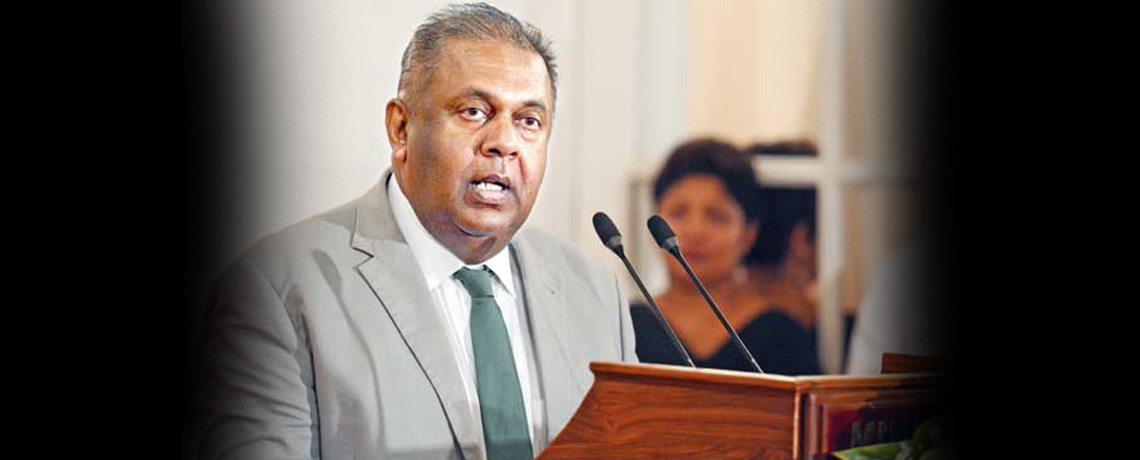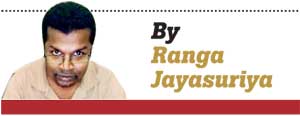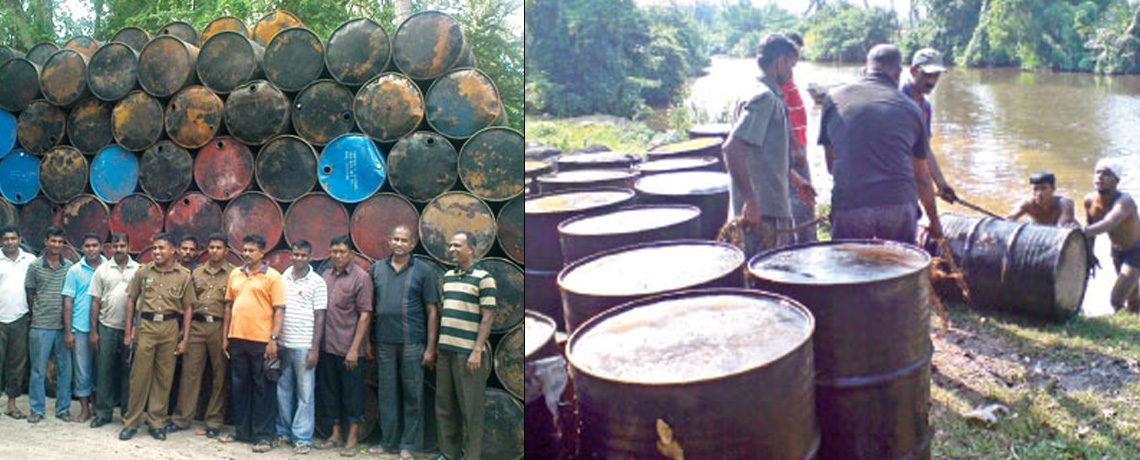05 Jul 2017 - {{hitsCtrl.values.hits}}

Mangala Samaraweera, the new finance minister wants to open liquor shops on Poya Days. In an opinion poll in the Daily Mirror website, 69 per cent of readers agreed with him. If the government wants to have a pulse of the people, it ought to take a note. Daily Mirror may not be read by many millions whose right to a decent education was plundered by misplaced Swabasha education policies, however still a sizable, aspirational and often bilingual community read it.
Sadly though, the government policies in our independent history have gradually degenerated into something akin to the blind leading the blind, as successive governments driven by electoral considerations became overly keen on appeasing a regressive majority, rather than implementing policies that would have helped them come out of the gutter.
 Mangala Samaraweera by opening liquor shops on Poya days cannot address those long entrenched problems in our system. However, his proposition is not a bad one, after all. One would hope the government has political courage to make that happen. Our illiberal and highly prohibitionist alcohol laws are a relic from a different time. Like many other vestiges of a bygone era, be it the colonial era Vagrant laws (which were periodically used against homosexuals) or other by-products of an early independent and post independent cultural awakening, which itself later went haywire, destroying much of the relative advantage the country had at the time of independence, those laws continue to distort reality.
Mangala Samaraweera by opening liquor shops on Poya days cannot address those long entrenched problems in our system. However, his proposition is not a bad one, after all. One would hope the government has political courage to make that happen. Our illiberal and highly prohibitionist alcohol laws are a relic from a different time. Like many other vestiges of a bygone era, be it the colonial era Vagrant laws (which were periodically used against homosexuals) or other by-products of an early independent and post independent cultural awakening, which itself later went haywire, destroying much of the relative advantage the country had at the time of independence, those laws continue to distort reality.
"Religious leaders, of course, have reservations about the booze. Conservative elites often oppose due to their vested interests, though many of them have a shot or two within their trusted circles."
They do more harm than any good. For instance, only beneficiaries of closing bars and wine stores on Poya Days are illicit moonshine brewers and bootleggers who sell the stuff from the backdoor. However, consequences of those highly prohibitionist laws run deeper. Government slaps too much tax on legal alcohol, forcing the vast majority of public to drink illegal brew, which obviously has a much greater health hazard.

An average Sri Lankan drinks 8.5 litres of alcohol, according to industry estimates. And 65 per cent of that is illegal brew, 35 per cent is legal hard liquor and five percent is beer. (According to WHO estimates of 2010, average Sri Lankan alcohol consumption is 3.7 litres ,of which 85 per cent is spirit). Those numbers themselves are sketchy for a large part of the industry is conducted illegally.
Recently a government minister went on record calling for a price reduction of a certain brand of arrack used by the low income earners; he warned that high taxes had driven the poor to ‘Kasippu’, exposing them to greater health hazards, and seriously depleting the disposable income of those families. He was right. Alcohol taxes in Sri Lanka have already gone well beyond the taxes in countries of relative per capita purchasing power parity.
"Recently a government minister went on record calling for a price reduction of a certain brand of arrack used by the low income earners; he warned that high taxes had driven the poor to ‘Kasippu’, exposing them to greater health hazards, and seriously depleting the disposable income of those families"
After a certain limit, which is already passed, only behavioural adjustments that those taxes could enforce upon the boozers are desperate choices that make things worse for them and their families. Sri Lanka’s alcohol taxes themselves are lopsided, and is an anomaly of the standard international practice. Beer (soft alcohol) is taxed almost equally as spirit, making the former unaffordable to most low income earners. That by extension is fostering a culture of hard liquor.
Then when further taxes are piled on legal spirit, the poor are forced to flock to moonshine dens. At the current prices, the government is imposing taxes amounting to Rs.315 per litre of strong beer and Rs 190 on mild beer.
Then there are highly restrictive and politicized alcohol licences, which are generally awarded as the pinacle of political favour to the most trusted political acolytes. The hypocrisy in this is that the politicians who publicly decry the ‘sinful’ industry, are in private jealously guarding their privileges emanating from it.
The economic dimension of this however is that the politicization of the whole thing retards the growth of an entertainment industry in this country, which can provide gainful employment to many hundreds of thousands of local youth. For a country of which young men and women toil in the Middle East under less than ideal conditions, squandering such an opportunity is a crime. Also, a vibrant night life could also serve as a modest way of income redistribution. It would also make tourists spend more.
"Also, a vibrant night life could also serve as a modest way of income redistribution. It would also make tourists spend more"
Religious leaders, of course, have reservations about the booze. Conservative elites often oppose due to their vested interests, though many of them have a shot or two within their trusted circles. Zulfikar Ali Bhutto, who enforced a total ban of alcohol in Pakistan in the 70s, in order to curry favours with the Islamists was known among Islamabad’s elites as a binge drinker. When his friends inquired, he has reportedly said, it was not meant for them, the elites, but for the masses on the streets. Those masses, who were radicalized through policies driven by petty personal and political calculations of Ali Bhutto and his successor Zia ul Haq, (who, interestingly enough, hanged Bhutto) have now turned Pakistan into an unhappy place for its moderates.
Leave aside all the above. There is one last reason to go soft on the booze. It has evolved to be part of our culture. Few dispute that, except those who have lived too long in their insular little cocoons. Trying to project a hearty drink as a major sin, only compels the people to live a lie.
Follow Ranga Jayasuriya @RangaJayasuriya on Twitter
23 Dec 2024 26 minute ago
23 Dec 2024 2 hours ago
23 Dec 2024 2 hours ago
23 Dec 2024 2 hours ago
23 Dec 2024 4 hours ago